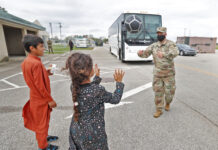CAIRO — Two protesters were killed when Sudanese security forces dispersed a demonstration late Tuesday in the capital of Khartoum, a local medical group said.
The violence broke out when dozens of protesters made their way late in the day to the sealed-off area outside the military’s headquarters to commemorate a deadly break-up of a protester camp two years ago. The protesters have demanded justice for those killed in the 2019 violence.
Security forces closed off major roads and streets leading to the government and military headquarters in Khartoum ahead of the protests.
The Sudanese doctors’ committee said security forced fired live bullets and tear gas to disperse the protesters, killing at least two people and wounding more than 15 others, some of them in critical condition.
The committee is the medical arm of the Sudanese Professionals’ Association, which spearheaded the popular uprising that led to the military’s ouster of longtime autocrat Omar al-Bashir in April 2019. Sudan has since then been on a fragile path to democracy and is ruled by a military-civilian government now rules the country.
There was no immediate comment from the government on the reported deaths. Prime Minister Abdalla Hamdok, however, called for an urgent meeting with his defense and interior ministers, Khartoum governor and the country’s chief spy.
Video footage circulated online showed protesters holding Sudanese flags. At some point, a mother of one of those killed in 2019 read a statement blaming that incident on Gen. Mohammed Hamdan Dagalo, commander of the paramilitary Rapid Support Forces and deputy head of ruling sovereign council.
A spokesman for the RSF did not respond to phone calls seeking comment.
The June 2019 disposal of the Khartoum protest camp coincided with the end of the Muslim holy month of Ramadan. Over 120 people were killed in that dayslong crackdown, according to protest groups.
The government established an independent committee in 2019 to look into the crackdown, but the panel repeatedly missed its deadlines for reporting, angering the victims’ families and protest groups.



